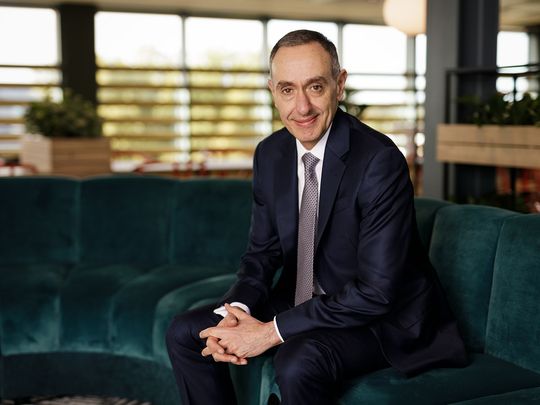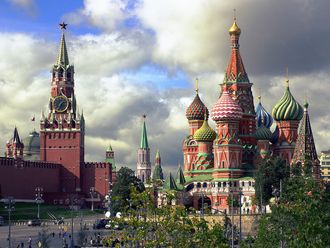
Dubai: Who’s going to drive the UAE and Saudi Arabia’s next growth wave for hotel and resort stays? The young. And its middle-class.
According to a top official at InterContinental Hotels Group, a younger skewing demographic and the fast-expanding middle-class base will play key roles in the growth narrative.
It helps that GCC governments are investing heavily into travel and tourism infrastructure, adds Elie Maalouf, the IHG Chief Executive. (In Saudi Arabia, the average monthly mid-tier income is estimated at SR10,000 and SR20,000, according to Statista.)
The UK-based hospitality juggernaut - whose brands include Holiday Inn, Vignette, Crowne Plaza, and Six Senses - saw strong momentum in its expansion efforts in the third quarter of this year. IHG added 17,500 rooms across 98 hotels, more than doubling its growth pace from last year.
By end 2024, the group expects to open 20 further hotels in the Middle East, Africa and India, raising the number of its properties in the region to nearly 220. This includes managed and franchised properties. Maalouf said that the company has a pipeline of close to 175 hotels in these markets, including plans to double its presence in Saudi Arabia.

“The trajectory for both international and domestic tourism is only upward, not to mention religious tourism in Saudi Arabia,” said Maalouf, who previously led the group’s North American business for nearly a decade. He was in the UAE ahead of the Future Investment Initiative Conference in Saudi Arabia.
Do you foresee any oversupply problems in the UAE or Saudi hotel sector?
We have seen these markets develop from very small business and tourism bases to global players. It is not unusual for the development to happen with highs and lows, with moments of undersupply, high occupancy, and then a little oversupply.
It takes time for properties to develop, and when they open, it may or may not be at the precise time of the highest demand.
Right now, we're not in a place of oversupply. In the UAE and Saudi Arabia, there's an undersupply. Our hotels are fully occupied almost all the time.
At InterContinental Festival City in Dubai, we run at nearly 100% on weekdays. Now, there are seasonal highs and lows, but there are ambitious plans to develop. We think that over time, it will be the right balance of supply and demand.
Are you concerned that investors might prefer Saudi Arabia as a higher growth investment opportunity?
I think they (investors) see Saudi Arabia and UAE as distinct, different markets. Saudi Arabia has a strong domestic market with a young and rapidly growing population and solid domestic industries.
The UAE, on the other hand, especially Abu Dhabi and Dubai, caters to global businesses and international visitors. While Saudi Arabia is increasing its international visitors, it remains a strong domestic market with a significant religious tourism component.
Both are different, will be successful, and remain interesting to our investors. As global capital grows and investors seek high-growth areas, both markets are attractive.
What are this IHG’s primary drivers for revenue growth, particularly in the Middle East?
The fundamentals of the travel and hospitality industry, the growth of the middle-class, and GDP growth are strong. This growth varies by region, sometimes stronger in certain areas and weaker in others. However, our strategy is globally diversified (IHG is present in 100 countries), allowing us to balance growth as different regions experience varied paces of expansion.
Looking at the full year rather than just the third quarter, growth has been steady across our key regions.
The Middle East, particularly Saudi Arabia, is becoming a destination in itself, not just a connecting hub between Europe, North America, and emerging Eastern markets. This year has been particularly strong here due to significant travel and tourism infrastructure investment.
Is the ongoing geopolitical crisis impeding your growth?
We have been in business for over 80 years, and unfortunately, there have been very few periods without conflict or tension somewhere in the world. Currently, there are conflicts in Ukraine and the Levant region of the Middle East, and we hope for a swift resolution to the hostilities.
In the meantime, most of our hotels in these regions remain open, and some are busy with people seeking refuge or arriving for aid and diplomatic efforts. Others are understandably less busy due to reduced demand. While these markets aren’t a major part of our business, we’re committed to them for the long term.
Are you operating the hotels in Lebanon as well? Are you seeing any sort of spillover effect in demand for your properties in Egypt and Jordan?
We have four hotels in Lebanon, and they are operating. We also have around six hotels in Israel, which are operating along with additional properties in Jordan and Egypt. They’re all open.
There has definitely been an impact on occupancy in these four countries. It’s unclear whether there will be a wider impact on the rest of the Middle East.
First and foremost, we all hope for a swift end to hostilities for everyone’s sake. In terms of a broader commercial impact, it’s still too early to tell. However, based on our experience, such impacts tend to be short-term and that these markets are resilient.
People’s desire to travel and come together returns quickly, even after periods of disruption.












